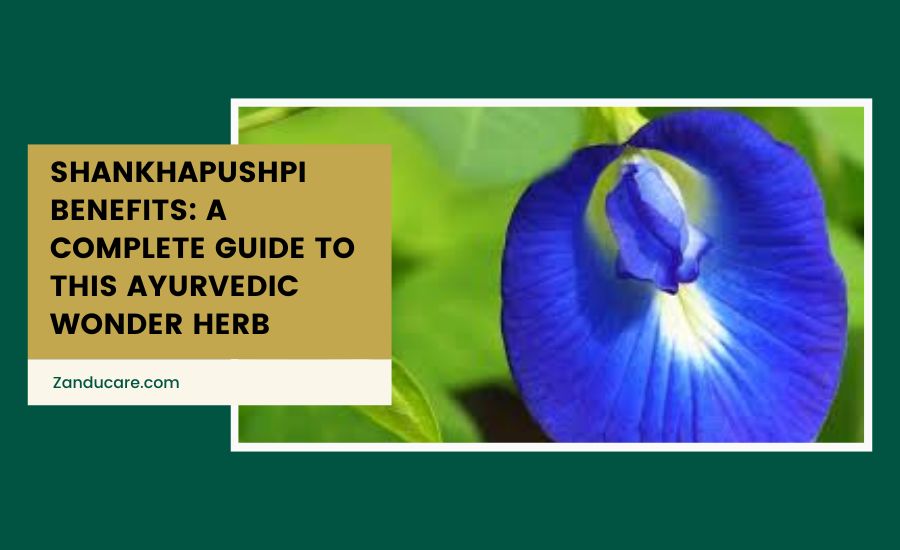
Shankhapushpi Benefits: A Complete Guide to This Ayurvedic Wonder Herb
|
Key insights:
|
Shankhapushpi is an age-old herb used in Ayurvedic medicine for its powerful health benefits. Known for its positive impact on cognitive function, stress reduction, and overall mental wellness, Shankhapushpi is becoming popular again as people turn to natural solutions for better health. This guide will explore the various benefits, uses, and scientific insights related to this remarkable herb.
|
Did You Know?
|
What is Shankhpushpi?

Shankhpushpi, scientifically called Convolvulus Pluricaulis, is a perennial medicinal herb native to India. In English, this herb is known commonly as morning glory, speed wheel or aloe weed and has distinctive arrowhead-shaped leaves and blue or white bulb-shaped flowers. In Ayurveda, Shankhpushpi is used extensively from root to tip for its wide therapeutic benefits. It goes by numerous Sanskrit names in Ayurvedic texts reflecting properties like memory enhancement, vomiting induction, improving digestion and appetite, skin disease treatment, inflammation reduction, cardiac health, and relieving worms.
Key medicinal qualities include boosting memory and cognition (Medhya), inducing vomiting (Vamana), enhancing digestive fire (Deepana), aiding digestion (Pachana), stimulating hunger (Rochana), treating skin conditions (Kusthahara), reducing swelling (Shothahara), benefiting heart health (Hridaya) and relieving intestinal worm infestations (Jantujit). This makes Shankhpushpi a potent solution for many health issues in Ayurvedic treatment.
Benefits of Shankhpushpi
Below are some of the benefits of Shankhpushpi:
1. Improves Cognitive Functioning
Shankhpushpi is a traditional treatment for improving brain function. Its potent antioxidants and flavonoids enhance a person's ability to remember things, focus, concentrate, be calm, and be attentive.
Shankhpushpi is a brain tonic and stimulant that enhances memory, reasoning, problem-solving, and other cognitive functions. The plant's neuroprotective components reduce brain strain and stop memory loss.
2. Shankhpushpi for Depression

Because of its strong anti-stress, anti-depressive, and anti-anxiety qualities, Shankhapushpi is highly valued for treating a variety of psychotic issues, including depression, dementia, restlessness, and more. It helps to calm the mind and body, balances the neurotransmitters in the brain, increases dopamine release, and controls serotonin levels. It also helps to lessen anxiety symptoms, including restlessness, unease, and cold hands and feet.
3. Stimulates Digestion
This ancient herb's digestive qualities are quite helpful in enhancing digestion. It improves digestion and increases the absorption of vital nutrients by inducing the release of digestive juices. Additionally, it relieves the symptoms of ulcerative colitis, irritable bowel syndrome, abdominal pain, and distension while preventing fluid retention.
4. Augments Skin Health
Shankhpushpi is essential to treat a variety of skin infections. The powerful herb's high antioxidant content effectively eliminates dangerous free radicals from the body, and its antipruritic properties reduce itching brought on by allergic diseases, including psoriasis, eczema, acne, sunburn, etc. Additionally, it functions as a skin tonic, deeply penetrates the skin, nourishes it from the inside out, and leaves the skin looking healthy and glowing. In addition, its antioxidative nature helps with wrinkles, fine lines, dark spots, and other ageing symptoms.
To minimise spots and fine wrinkles and attain younger, more radiant skin, regularly apply a solution of one tablespoon of Shankhpushpi powder, honey, and rose water to your face.
5. Anti-wrinkle

Wrinkles are caused by ageing, dryness and lack of moisture in the skin. In Ayurveda, imbalanced Vata dosha is seen as the root cause. Shankhpushpi oil helps control wrinkles by increasing moisture retention in the skin. It also slows down skin cell degeneration and has anti-ageing effects owing to its Rasayana property, which promotes rejuvenation.
Some tips for using Shankhpushpi for wrinkle treatment: Take 1/2 to 1 teaspoon of Shankhpushpi powder and mix it with some honey to form a smooth paste. Apply this paste to the face and neck. Allow it to sit for 20-30 minutes before washing off with cool plain water. This helps drive the herbs’ moisture and rejuvenating compounds into the skin.
Doing this regularly counters dryness, while the Rasayana property helps minimise wrinkles by slowing skin ageing. It balances Vata and builds skin strength from the inside to restore a youthful appearance.
6. Helps in Healing Wound
Due to its Ropan (healing) and sita (cooling) properties, Shankhpushpi helps speed up wound healing, reduce swelling, and restore normal skin texture. It also decreases skin inflammation. Some tips to use Shankhpushpi for wound care: Take 1⁄2 to 1 teaspoon of Shankhpushpi powder and boil it in 2 to 4 cups water until the volume reduces to 1 cup. Filter this liquid and use it to cleanse the wounded area once or twice daily to promote quicker healing.
The active compounds in Shankhpushpi drive wound closure, while the cooling property helps soothe inflammation and swelling. This reduces skin irritation, allowing the tissue to mend faster. Regular cleansing with this boiled Shankhpushpi water also prevents infection while removing dirt and debris that delays recovery. The phytochemicals enhance cell regeneration to normalise skin texture and colour after healing. Its antiseptic, anti-inflammatory, and growth-promoting effects make Shankhpushpi an excellent natural solution for faster wound repair.
Various Ways To Take Or Use Shankhpushpi

Here are some key ways to take or use Shankhpushpi:
- Shankhpushpi Tablets/Capsules: Swallow the tablet or capsule with milk or water, preferably after meals daily or as an Ayurvedic practitioner advises.
- Shankhpushpi Powder: Mix the herb's powder in lukewarm milk and drink it in the mornings after eating food to help boost memory over time.
- Shankhpushpi Juice: Take two shots of the juice mixed with water per day. This helps prevent memory loss and promote brain health.
- Shankhpushpi Oil: Gently massage oil on the forehead and scalp to relieve stress and headache symptoms.
- Shankhpushpi Decoction: Boil the powder in water, cool, strain and apply the liquid on wounds using cotton to protect against infection and accelerate healing.
Side-Effects of Shankhpushpi
Shankhpushpi has no proven adverse effects; however, consulting a doctor is advised, especially if taking other medications, to check for harmful interactions. As it mildly lowers blood pressure, people with existing hypotension should get medical guidance before using Shankhpushpi. Pregnant women should also get a doctor’s approval before taking this herb and avoid self-medication. Being an herbal formulation, Shankhpushpi has a bitter taste that some may find unpalatable.
This can occasionally cause mild nausea or vomiting tendency when ingesting it. These symptoms usually resolve on their own, but inform your Ayurvedic practitioner if it persists. Mild gastric side effects may also be avoided by taking Shankhpushpi with food rather than an empty stomach. Start with small doses and gradually increase quantity as tolerance builds. Introduce children and the elderly to this herb in small amounts first. Thus, while typically safe, speak to an Ayurvedic doctor to mitigate any potential risks before supplementing with Shankhpushpi.
Precautions to Take with Shankhpushpi
It is advisable to consult a healthcare provider before taking Shankhpushpi to ensure it is safe. Here are some precautions one should consider:
- Consultation: Get medical advice, especially if you have existing health conditions or take other medications, before starting Shankhpushpi or any new supplement.
- Pregnancy and Breastfeeding: Pregnant and nursing women should refrain from using Shankhpushpi unless explicitly instructed by a doctor that it is safe.
- Dosage: To prevent adverse effects, take only the prescribed Shankhpushpi dose as directed. Consuming more than required could be harmful.
- Children and Elders: Introduce Shankhpushpi cautiously to children and older adults. Before supplementing with this herb, consult an ayurvedic practitioner on appropriate dosage and usage guidelines for them.
Also, do check our related guides:
Conclusion
Shankhapushpi is a versatile and powerful herb rooted in Ayurvedic tradition. It offers a range of benefits, from improved cognitive function and stress reduction to enhanced sleep and immunity. Its adaptogenic properties make it a valuable natural remedy for those looking to boost mental and physical well-being without synthetic supplements. Incorporating Shankhapushpi into your wellness routine can significantly improve your health, whether consumed as a tea, powder, or capsule.
Try integrating Shankhapushpi into your daily life and experience firsthand the benefits of this Ayurvedic wonder herb.
FAQs
1. Is Shankhpushpi scientifically proven?
Individual studies on CNS depression, anxiolytic, anti-amnesic, tranquillising, anti-depressant, anti-stress, neurodegenerative, antioxidant, hypolipidemic, immunomodulatory, analgesic, anti-fungal, and antibacterial have demonstrated the therapeutic potential of various Shankhpushpi varieties.
2. What are the benefits of having Shankhpushpi?
Ayurveda claims that Shankhpushpi aids brain relaxation and reduces tension and anxiety. Its Medhya (improves intelligence) characteristic also acts as a brain tonic, improving memory. To aid in improving memory and focus, consume Shankhpushpi powder with warm milk or water.
3. How long does it take to see results?
The time it takes to notice benefits can vary from person to person. Most people start observing improvements in cognitive function and reduced stress levels within a few weeks of regular use.
4. Can children take Shankhapushpi?
Yes, Shankhapushpi is safe for children in appropriate doses. Ayurvedic formulations often use it to support children's cognitive development and improve concentration.
References:
- Shankhpushpi is a traditional treatment for improving brain function. (https://www.sciencedirect.com)
- Because of its strong anti-stress, anti-depressive, and anti-anxiety qualities, Shankhapushpi is highly valued for treating a variety of psychotic issues, including depression, dementia, restlessness, and more. (https://www.researchgate.net)
- This ancient herb's digestive qualities are quite helpful in enhancing digestion.(https://www.ayurvedjournal.com)
- Shankhpushpi is essential to treat a variety of skin infections.(https://www.researchgate.net/)






Leave a comment
This site is protected by hCaptcha and the hCaptcha Privacy Policy and Terms of Service apply.